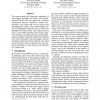Free Online Productivity Tools
i2Speak
i2Symbol
i2OCR
iTex2Img
iWeb2Print
iWeb2Shot
i2Type
iPdf2Split
iPdf2Merge
i2Bopomofo
i2Arabic
i2Style
i2Image
i2PDF
iLatex2Rtf
Sci2ools
EMNLP
2004
2004
Unsupervised WSD based on Automatically Retrieved Examples: The Importance of Bias
This paper explores the large-scale acquisition of sense-tagged examples for Word Sense Disambiguation (WSD). We have applied the "WordNet monosemous relatives" method to construct automatically a web corpus that we have used to train disambiguation systems. The corpus-building process has highlighted important factors, such as the distribution of senses (bias). The corpus has been used to train WSD algorithms that include supervised methods (combining automatic and manuallytagged examples), minimally supervised (requiring sense bias information from hand-tagged corpora), and fully unsupervised. These methods were tested on the Senseval-2 lexical sample test set, and compared successfully to other systems with minimum or no supervision.
EMNLP 2004 | EMNLP 2007 | Sense Bias Information | Word Sense Disambiguation | WordNet Monosemous Relatives |
| Added | 30 Oct 2010 |
| Updated | 30 Oct 2010 |
| Type | Conference |
| Year | 2004 |
| Where | EMNLP |
| Authors | Eneko Agirre, David Martínez |
Comments (0)

